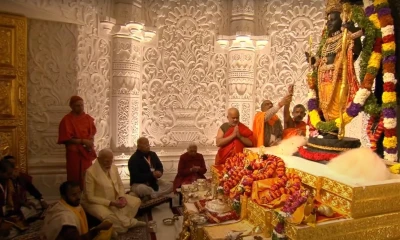Prime Minister Narendra Modi presided
over the ‘pran pratishtha,’ or consecration, of the Ram Temple in Ayodhya,
marking the completion of a 50-year BJP project and realizing a long-standing
promise. The live ceremony featured RSS chief Mohan Bhagwat alongside the PM,
emphasizing the significance of the event.
PM Modi expressed his joy to be part of
this “divine program” and anticipated the emotional impact of consecrating Shri
Ram Lala’s life in Ayodhya Dham. Earlier, he shared an aerial video of Ayodhya
adorned with flowers and decorations, highlighting the festive atmosphere
surrounding the temple, located approximately 18 km from the town.
The consecration celebration resonated
across Bharat, with Indians abroad participating through prayers at local
temples. The occasion, likened to ‘Diwali,’ symbolizes the festivities that
marked Lord Ram’s homecoming after defeating Ravan.
High-profile invitees included Bollywood
stars Amitabh Bachchan, Rajinikanth, Katrina Kaif, and business tycoons like
Sunil Bharti Mittal and Anil Ambani. Renowned cricket figures, including Sachin
Tendulkar and Virat Kohli, were also in attendance.
PM Modi, reportedly observing preparatory
rituals such as sleeping on the floor and consuming only coconut water, is set
to address the gathering and interact with the labourers involved in the temple’s
construction.
The Nagara architectural style is
reflected in the temple’s design, featuring 392 pillars, 44 doors, and walls
adorned with intricate carvings.
The temple’s inauguration, at the center
of a decades-long political controversy, faced opposition from parties like
Congress, Left, Trinamool, and Samajwadi Party, accusing the BJP of exploiting
religion for political gain. The BJP countered, labeling those who declined the
invitation, including Congress leaders Mallikarjun Kharge and Sonia Gandhi, as
anti-Hindu.
Controversies also arose with the Shankaracharyas
of Puri and Joshimath criticizing the consecration of an incomplete temple and
questioning the PM’s presence inside the sanctum sanctorum.
The temple’s construction commenced
following a landmark Supreme Court judgment in 2019, allocating the disputed
land for the temple and providing an alternate plot for a mosque to Muslims.

















